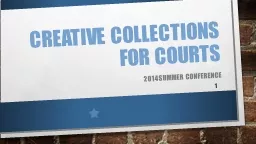PPT-Chapter 5 - THE COURTS NATIONAL SECURITY POWERS
Author : andres | Published Date : 2024-11-03
1 Basic Standing Still Applies in National Security Cases 1 suffered an injury in fact 2 that is fairly traceable to the challenged conduct of the defendant and
Presentation Embed Code
Download Presentation
Download Presentation The PPT/PDF document "Chapter 5 - THE COURTS NATIONAL SECURIT..." is the property of its rightful owner. Permission is granted to download and print the materials on this website for personal, non-commercial use only, and to display it on your personal computer provided you do not modify the materials and that you retain all copyright notices contained in the materials. By downloading content from our website, you accept the terms of this agreement.
Chapter 5 - THE COURTS NATIONAL SECURITY POWERS: Transcript
Download Rules Of Document
"Chapter 5 - THE COURTS NATIONAL SECURITY POWERS"The content belongs to its owner. You may download and print it for personal use, without modification, and keep all copyright notices. By downloading, you agree to these terms.
Related Documents














